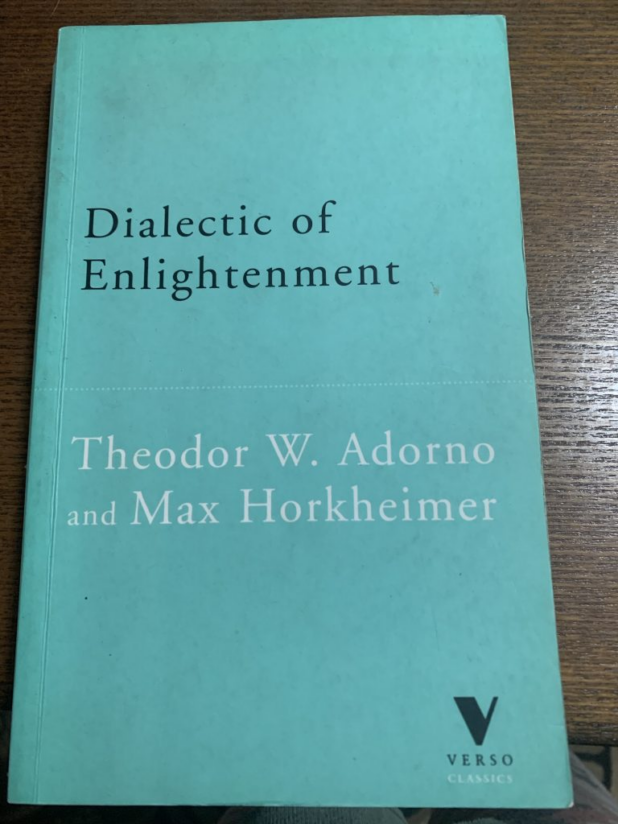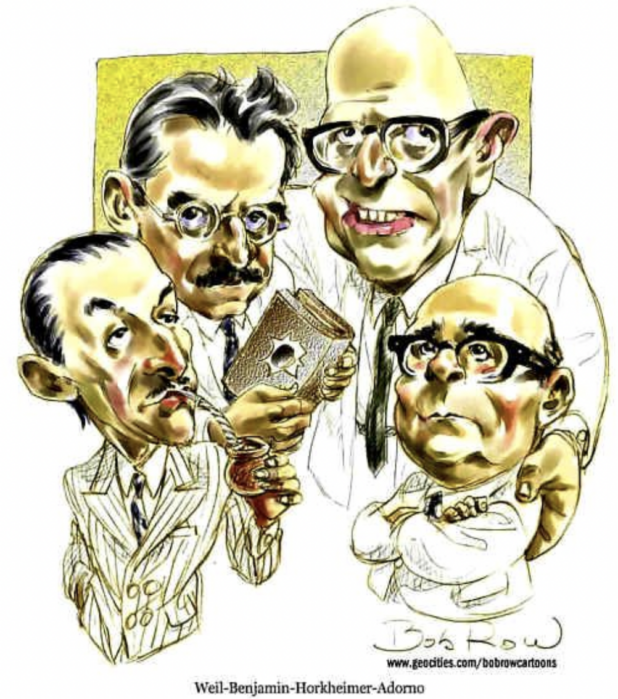This article is the work of a reader named Coltraine.
I have been recently reading Adorno and Horkheimer’s Dialectic of Enlightenment, published in 1947 as one of the Frankfurt School’s first public forays into what Jews had been involved in conspiratorially for decades and what later got labelled Critical Theory. Basically, the Jews of Germany were throughout this period internally trying to undermine Hitler’s National Socialist revolution through academia and culture before it could even get off the ground formally, and after the war, their goal switched to “Never Again!” almost overnight. We have been living now for 70+ years under that vow of theirs.
And so I basically just had some observations that I thought I’d share with the forum because I had the time and I wanted to get this down as a reference for posterity. Nothing here is like revolutionary or anything in my opinion, and at least on this forum mine would probably be a common judgment if anything of the book, its agenda, its thesis, its whole basic premise to begin with, and how all this has combined in the century after the book’s publication to define how these topics are commonly framed and presented (ironically uncritically) to the general public today whether in an academic setting or within just the more general realms of politics and culture. But I figured that even here on the forum, many of you guys might not be very familiar at all with the book’s specifics- although I’m sure everyone has observed the Frankfurt School’s influence in the West in one way or another. And while even normies now are referencing “Cultural Marxism”, I think basically that we ourselves in order to guide normie-cons particularly should generally have some sort of formal responses or rebuttals to these major ongoing Jewish intellectual conspiracies, which is what the Frankfurt School and its Critical Theory is basically, on hand always so that we can reference it if/when needed whether we’re red-pilling normies or we’re debating Ben Shapiro or Rachel Maddow and their partisans respectively. So what follows is my basic rebuttal and what I wrote down late last night immediately after finishing it. For those of you who need a quick refresher in the form of a video, this below does a decent job at presenting the background:
In Dialectic of Enlightenment, the authors basically see this pattern throughout Euro history singularly of reversion to what they consider evil, outdated, and backward movements and modes of being. They focus on Fascism in particular because when they wrote the book this is what frightened them and all Jews most globally, because then as now its ethos was an alternative to the miseries of modernity. So keep in mind that what Horkheimer and Adorno Semitically see below as “self-destruction” stereotypically is in reality rather “course-correction” in for example the rise of the Third Reich as well as other prominent historical instances of challenge to Semitic hegemony. For example, just from the book’s description on Amazon we find:
a paranoid behavioral structure, expressed in aggressive anti-Semitism, that marks the limits of enlightenment. The authors perceive a common element in these phenomena, the tendency toward self-destruction of the guiding criteria inherent in Enlightenment thought from the beginning.
To start to unpack all that, we see that the authors here just assume that “enlightenment” was ever even desirable or practically practicable in the first place, which it wasn’t. In the very beginning, the Enlightenment was forced top-downward upon the people, who were at best ignorant, gullible, and naive of the new bargain being struck (proverbially with Satan, or his earthly representatives the Jews) in the modern “social contract”, which favored individuality over corporate identity, which the Jews would use in the future not only to install themselves as this new democratic regime’s high-priests and celebrities but also to undermine our culture, religion, and ethnic identity. For if the people would’ve comprehended the totality and ubiquity of transformation then being proposed, they would’ve rejected it wholesale and emphatically most likely, which is why it was forced upon the people regardless of preference. The Enlightenment despite what Wikipedia says was not popular really, and the people back then in the main wanted nothing more than to maintain their religion and corporate identity. It was dominated really by a new merchant class of rootless cosmopolitan in alliance with the former regime’s minor nobility who desired to cheat its way to the top of the hierarchy under the pretext of Democracy.
So the authors here are developing this dialectic, which is real and historical in my opinion, between their ideal in Radical Enlightenment on one side verses the people’s natural reversion and reaction back to hierarchy, monarchy, theocracy, and collectivity that the French Revolution and its consequences eventually robbed people of to the point of today where everyone’s just rootless cosmopolitan cogs in the Machine. People like Joseph de Maistre and even Edmund Burke pointed this all out at the time though remember. It’s just that then as today those Counter-Enlightenment voices were censored and thus filtered out of the culture accordingly. De Maistre himself would be forced into exile in Russia away from his homeland and people solely because he saw through the duplicity and deception of the Enlightenment deal that was too good to be true.
So yeah the dialectic between Radical Enlightenment and its opposite in some form of proto-Fascism definitely was real, it happened then in the 19th Century as it plays itself out now as well, and it happened on some level even prior to the French Revolution. It’s just that prior to that point, the forces of Reaction and Tradition were usually always more than enough to bend the needle enough to defeat the perpetual encroachment of the Modernists. So our authors got that correct in my opinion.
Another thing our highly Semitic authors got correct, here, is their judgment of the Third Reich as historically normative. See:
Using historical analyses to elucidate the present, they show, against the background of a prehistory of subjectivity, why the National Socialist terror was not an aberration of modern history but was rooted deeply in the fundamental characteristics of Western civilization.
That’s sort of the money-quote right there in the Amazon description, because it forms the foundation for where my opinion diverges now from that of our Frankfurt School authors.
As we know, the Third Reich was deeply rooted in Western civilization obviously, and this was why it was so popular and briefly successful. This same “terror” against Jews was a permanent fixture and general pattern throughout history– and not only Western history either. The Jews actively engineer enemies against them in reaction to their behavior everywhere they go historically and currently. From Imperial Roman-era Tyre to Medieval Spanish Toledo to WWII-era Tripoli in Africa to modern-day Turkey, the Jews would be pogromed, dispossessed, and expelled throughout history. Yet this is coincidentally the one side of the story that normally Jews won’t inform their less educated audience, because it demolishes the idea of the uniqueness of The Holocaust™, and then marginalizes the fact that Fascism itself (or similar forms) was/is the norm throughout history. Democracy, however, is this unproven product- especially in the context of the modern world over great geographical and national distances and multiplicities of peoples.
So the Third Reich was nothing special in this context- as I’ve talked about prior. And while these Christ-killing authors would crucify all of Europe and its history currently in order to explain this persistent “pathological” behavior, the dialectical equation resolves itself much, much more simply and satisfactorily indeed by looking simply at what the Jews did themselves to deserve such reaction- again and again and again throughout history. Yet collectively Jews can never be at fault either in modernity- so says Jews, who remember from above are Democracy’s new priest-class and “experts”. This is because the Jews’ faultless nature was more or less the first premise accepted under the new Enlightenment conditions imposed as said prior from above upon an unsuspecting population. Immediately upon the aftermath of the French Revolution, even Napoleon figured out quite quickly at his Paris Sanhedrin that collectively, legally, Jews were untouchable basically. They could no longer be dealt with in accordance with traditional corporate expulsion or collective punishment for their criminal and antisocial behavior. They were neither a polity nor religion now in the eyes of the Enlightenment, but mere individuals legally incapable of conspiracy essentially. Jews would then use England to undermine Napoleon financially and eventually militarily.
Treating the Jews individually rather than collectively was the first Enlightenment plank and belief objectively, because post-Enlightenment the Jews would use this new status-quo to blind us to the reality of Jewish subversion, co-option, and eventual domination. Rather, the Enlightenment’s new “social contract” guaranteed Jews’ newfound freedom as individuals on the basis of their individuality legally rather than as a corporate body as Jews were judged prior in pre-modernity and as Hitler judged them by default more or less under the Third Reich. So in conclusion, we must realize that there was an important dialectic in Enlightenment as Adorno and Horkheimer declare. The people are constantly trying to get out of this ideological trap whether they realize it or not, but the Jews still today are always socially-engineering the masses back into the paradigm where the people because of the paradigm’s perimeters cannot detect let alone admit and declare this Jewish conspiracy- nor can the people even really stand up for themselves collectively either as we’ve seen. So we agree with the authors on the dialectic itself, but we part ways with their analysis when they prejudge the reaction (i.e. the Fascism) as pathological and unnatural, because we understand that these repeated reactions are completely natural and in accordance with the will of the people collectively.
Thoughts? Observations? Criticisms? Suggestions for future book reviews or biographies? Normally I don’t have enough time to be doing this as it’s hard enough to find enough time just to read these books myself let alone outline their basic contents formally in front of an audience, but I had that today and so I may again in the future. As I said above briefly, we need to have standardized arguments already ready to rebut these sorts of familiar Jewish declarations, and I hope to eventually put down more of them to posterity.
 Daily Stormer The Most Censored Publication in History
Daily Stormer The Most Censored Publication in History





